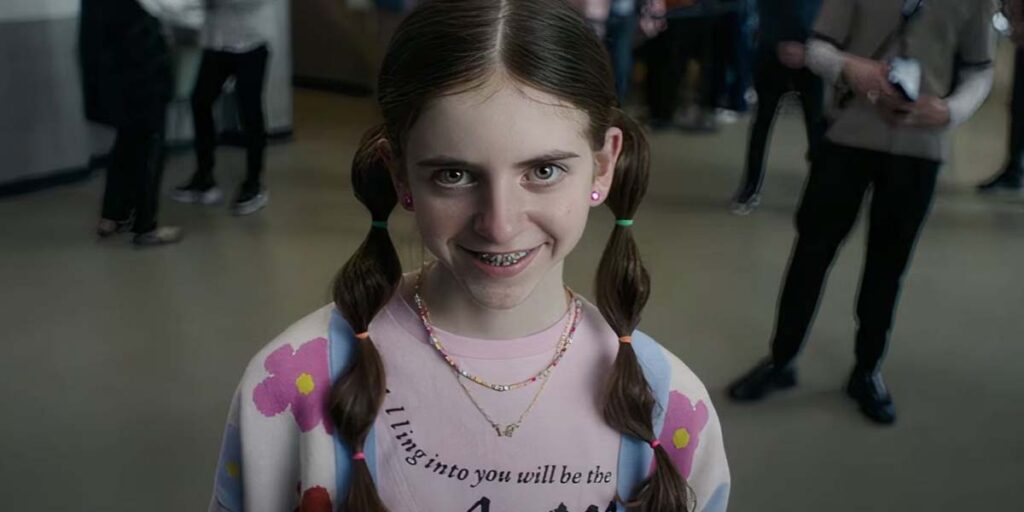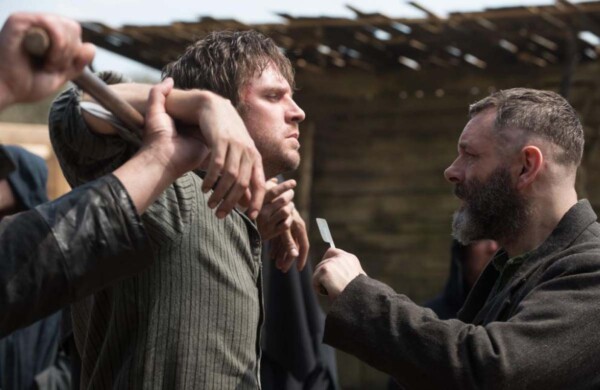Del reviews ‘Smile 2’

Pop singer Skye Riley finds herself being stalked by the Smile Entity in the followup to the viral horror movie hit "Smile" from 2022. This new excursion into that universe is even bloodier than the first. Paramount Pictures.
“Smile 2” Starring Naomi Scott, Rosemarie DeWitt, Lukas Gage. Directed by Parker Finn. Two hours, 7 minutes. Rated R. Theatrical release.
Plot summary: Comeback rock star Skye Riley finds herself stalked by the Smile Entity after witnessing the gruesome suicide of former classmate and sometime drug provider Lewis. A stranger, Morris, offers her a possible way of beating the entity.
Spoilers? None.
Del’s take
Halfway through “Smile 2” the couple behind me got up and left. I should have gone with them.
I didn’t like the movie.

Critics are raving. It was the top box-office draw its opening weekend. It’s well made and well acted. Director Finn and distributor Paramount are thinking about a threequel, I bet.
But lowly I, me, yours truly, didn’t like it. Why?
Because once upon a time horror movies were scary. “Smile 2” isn’t scary. It’s gross, violent and depressing, but it’s not scary.
I will say this: It’s got the coolest soundtrack I’ve heard in recent memory. And the cinematography was awesome. Upside aerials over the city? Very cool.
And the talent was invested in this film, no doubt. Naomi Scott and Rosemarie DeWitt were terrific. The others were good, some even memorable, like the creepy little girl at the meet-and-greet, who spoke nary a word but stared – and smiled.

But what can I say? I didn’t like the movie.
I remember a day when horror movies relied on storytelling, tension, and the audience’s imagination to make them scary. These days it’s all about jump scares and gore, and “Smile 2” is generously endowed with both. We get to see faces smashed with gym weights, jawbones ripped from skulls, daggers of glass pulled from bloody feet – it goes on and on. After awhile you just sit there in your movie theater seat, the soles of your shoes sticking to the gooey floor as this bloody spectacle plays out on the screen, the last molecule of empathy in your body bludgeoned into senselessness. The couple behind me missed the really bad parts.
Plus, it’s hard to feel anything for people who are so shitty, and every character in this movie is a creep to some degree, from burned-out ex-junkie Skye (Naomi Scott) to her insufferable stage mom Elizabeth (Rosemarie DeWitt) and looney drug dealer Lewis (Lukas Gage). Who cares if any of these guys gets a bedazzled microphone shoved through the eye?

Finally, what is the point of all this? What kind of object lesson are we supposed to learn? I tried to decide if “Smile 2” was a treatise on the wages of guilt, or a condemnation of the hollowness of fame and those who chase it. In the end I decided it was nothing but a pointless bloodbath.
But don’t listen to me. The critics love it, and so do moviegoers. Box Office Mojo reports “Smile 2” earned $23 million its first weekend, which topped the charts. All those people, and all that money, can’t be wrong. Right?
I give it a grade of C. Too bloody, too violent, too depressing for lowly me.
Del Stone Jr. is a former journalist and writer.


Image courtesy of Severn Screen.
“Apostle” Starring Dan Stevens as Thomas Richardson, Michael Sheen as Malcolm, Richard Elfyn as Charles, Paul Higgins as Frank, Bill Milner as Jeremy, Catrin Aaron as Elaine, Lucy Boynton as Andrea Howe, and others. Directed by Gareth Evans. 2 hours, 10 minutes. Rated TV-MA. Streaming on Netflix.
Plot summary: A man goes undercover to rescue his sister from the clutches of a religious cult that has taken up residence on a secluded island. During his attempt to free his sister he discovers a horrifying secret being kept by cult leaders.
Are there spoilers in this review: Yes. Read at your peril.
Del’s take
“Apostle” is two movies in one.
On the surface it’s a high-tension thriller about a man trying to rescue his sister from the clutches of a religious cult. But it’s also about a uniquely weird and horrifying supernatural secret being kept within the bleak, windswept hills of a deserted island.
I should have saved this review for Halloween because “Apostle” would fit that bill perfectly – as scarefests go it departs from the usual Spooky Season fare. You’ll find no unkillable slashers, shrieking ghosts or giant reptiles here. Instead, it’s a tense period piece from the debut of the previous century with a quietly anarchic feel, more reminiscent of “Midsommer” and “Wicker Man” than “Friday the 13th.”
I’m not familiar with Evans’ work but I am becoming a fan as “Apostle” is the rare movie that undergoes a tectonic shift in pacing and tone at about the halfway point, and somehow it all works. From quietly tense to madness, “Apostle” asserts the power of suggestion can be a dangerous weapon, but what lies behind that power could be even worse.
“Apostle” is also one of those movies where the setting abets the theme. It was shot mostly in Wales along the coastline and embodies the harsh, threadbare and downright mucky quality of life such locales had to offer in the early 20th century. Rocky coastlines flanked by fields of wiry grass giving way to dark, dank forests, operate as a kind of additional character in the story, similar to the way the cold and snow worked in the original “Let the Right One In.”
But it’s what lurks beneath those hills and forests that really drives the story, and while its presence is hinted at in the first half of the film, the second half becomes a quest to bring everything into the rational light of day while defeating the antagonists and acquitting the victims. At this point “Apostle” goes from slow burn to a furious boil of gore, blood, and horror layered upon horror, much like events leading up to the climatic scene in “Texas Chainsaw Massacre.”
All the actors were terrific in this film, but Dan Stevens’ desperate Thomas Richardson stands above the others. Also notable were Lucy Boynton as skeptical Andrea Howe and Bill Milner as the callow Jeremy. If I had to criticize the movie for anything, it would be the relative unlikability of Thomas, who seemed to hover somewhere between devoted rescuer and drug-addicted looney.
Mladen is already crabbing about it not having lots of foul language or sex. There are sex scenes, but I’d describe them as demur. As for the cussing, well, what can I say? This was turn-of-the-century England, not MAGA America.
I’ve watched movies that in one small way or another remind me of parts of “Apostle,” but I think it’s safe to say you’ve never seen anything like it. Evans tells a fascinating and entertaining story, one that’s worth your 2-hour, 10-minute commitment to watch it.
You won’t be disappointed.
Del’s score: B+

Mladen’s take
Speaking of MAGA. When I read Del’s summary of “Apostle,” I assumed the movie was about the Republican Party under Trump. I was mistaken. “Apostle” is tame compared to the back-stabbing, power-hoarding, hyper-erratic, yellow-bellied, proudly racist, and gullible males and females classifying themselves as GOP-ers these days.
Also mistaken is Del’s review of “Apostle.” It’s crappy and just barely more tolerable than torture movies such as “Saw” or “Hostel.” Only smart and beautiful redhead Andrea kept me watching because she bridged the gap between the film’s decent portrayal of cultism and its grotesque, nearly gratuitous descent into body horror starting with the brain drill.
The film’s most interesting character is religious sect prophet Malcolm (portrayed by Micheal Sheen). As the cult’s top religionist, Malcolm balances charisma, desperation, and dislike for needed violence, as he defines it, pretty darn well. His sole goal is keeping his colony functioning by eluding an impending doom even if that means shedding the Almighty for paganism. Now that I think about it, that’s interesting. The libertarian god of Malcolm’s beliefs most share space with the nature witch who control the island’s plant life.
“Apostle” costumes and bleak environment, mostly grays and blacks, suit the plot nicely as Del noted but other elements are askew.
First, there’s no way that turn-of-the-19th century Englanders, not to say self-exiled cultists living on the edge of poverty, had such perfect teeth.
Second, our protagonist Thomas is accidently the scariest person in the film. It wasn’t his opium addiction. It wasn’t that Thomas got a man murdered by doing a ticket switch to get on a guarded boat to the unholy island warren of Erisden. It was the persistent expression on his face, particularly the eyes. He looked evil with eyes always darting never blinking and, I don’t know, glowing preternaturally.
Third, where Del sees a wonderful transition from the film’s first half of seething, albeit, discreet menace and hypocrisy to a father murdering his teenaged daughter with a knife, then her teenaged lover with the hand-powered brain drill, then shooting Malcolm with a sawed-off shotgun, and then threatening sexy Andrea and Thomas’s sister, I see a movie running out of ideas to convey the dangers of cults and the rhetoric that inspires regular folk to dive into the deep end of an empty pool.
And, finally, I have no idea why the beast-man with his reed-wrapped head was needed. Yes, the soiled being, apparently, protected and fed the nature witch with blood and flesh from animals and then humans but from where did he come? Who or what was he? Why did Malcolm trust the beast man to care for the increasingly apathetic, or was it disillusioned, pagan who ran the island’s environment. I believe the beast man was inserted into the movie for on scene alone, the one where he tries to grind Thomas into food pellets and strips for the witch. Yuck and a repulsive yuck at that.
I agree with Del. Y’all probably never saw anything like “Apostle” and you may not want to.
Mladen’s score: A generous C because the first half of the movie isn’t bad.
Mladen Rudman is a former journalist and technical writer. Del Stone Jr. is a former journalist and writer.